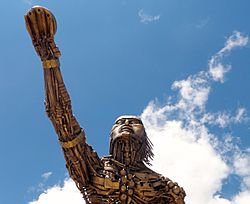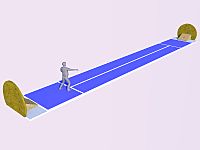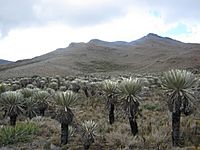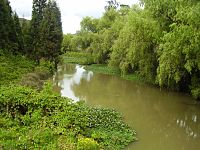Chaquén facts for kids
Quick facts for kids Chaquén |
|
|---|---|
| Sports, fertility | |
| Member of Muisca religion | |

|
|
| Region | Altiplano Cundiboyacense |
| Ethnic group | Muisca |
| Festivals | Sowing and harvest |
| Greek equivalent | Demeter |
| Roman equivalent | ~Mars |
Chaquén was a very important god for the Muisca people. He was known as the god of sports and fertility. The Muisca lived in what is now central Colombia. They were one of the four advanced civilizations in the Americas.
Sports were a big deal for the Muisca. They were a warrior society, so training fighters was very important. They often fought battles between their own groups, like the zipazgo and the zacazgo. They also fought against other native groups like the Panches and Muzos. When the Spanish arrived in Colombia, they met fierce resistance. These were the guecha warriors, who were trained with Chaquén's help.
Contents
Who Was Chaquén?
Chaquén was believed to fly over the Muisca's rich farm fields. He would appear during their contests and celebrations. A writer from the 1600s, Pedro Simón, wrote about Chaquén. He said the Muisca held races and competitions on their holidays.
During these events, people would dance with lots of feathers. They played flutes, horns, and drums. People wore special uniforms and animal skins. Some even wore crowns made of fine gold. Winners received beautiful decorated cloaks. The parties were always filled with chicha, a traditional corn drink.
Celebrations for Chaquén
In the first months of the year, the Muisca held big farming parties. These were around their crop fields to honor Chaquén. They wanted to make sure they had a good harvest. Men and women danced together, holding hands. They played flutes and horns, singing both happy and sad songs.
They held earthenware bowls filled with chicha. These parties were not just for good harvests. They were also a chance for young men and women to meet. Caciques, who were local chiefs, and other important people also found their partners at these events. Honoring Chaquén was a celebration of fertility. This meant fertility for their crops and for the Muisca people themselves. The rituals involved many feathers and special costumes. These were also used in Muisca warfare.
Chaquén's Story: Tintoa and Sunuba
condemnation of Sunuba
Chaquén was not only the god of sports and fertility. He also played a part in the myth of Tintoa and Sunuba. Tintoa was a brave young guecha warrior. He fell in love with Sunuba, who was the main wife of a prince. When Sunuba's husband went to war, he left her in charge.
When the prince returned, he found out about Sunuba and Tintoa. He decided to punish them. The lovers ran away to escape the law. Chaquén found them and punished them by turning them into plants. Sunuba became a type of cane or reed. She was condemned to live near the waters of the Bogotá savanna's swamps. Tintoa became a dry weed, growing only in dry areas. This separated them forever.
Chaquén's Legacy Today
The game of tejo is still played in Boyacá and other parts of central Colombia. This game comes from Muisca times. In tejo, players throw clay discs. The goal is to hit small explosive targets for points. This game was popular even before the Spanish conquistadores arrived. It is still very popular in the villages of the Altiplano Cundiboyacense.
A theme park in Sumapaz, Bogotá, is named after Chaquén. This shows how important he remains in Colombian culture.
See also
 In Spanish: Chaquen para niños
In Spanish: Chaquen para niños
 | Emma Amos |
 | Edward Mitchell Bannister |
 | Larry D. Alexander |
 | Ernie Barnes |




